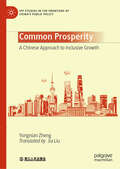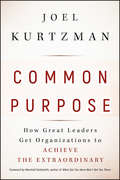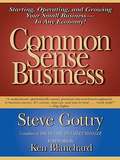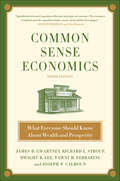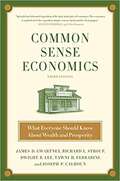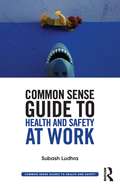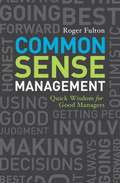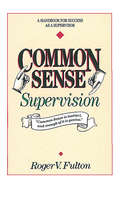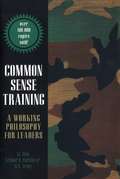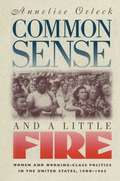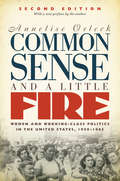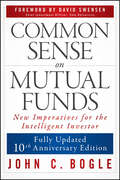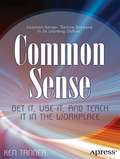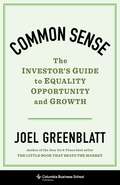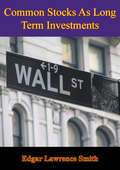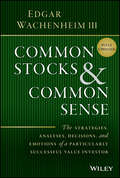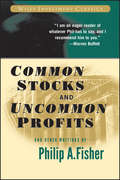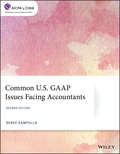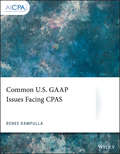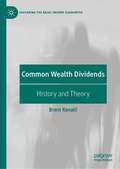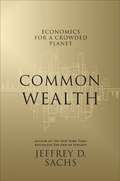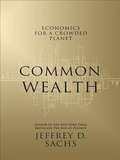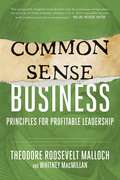- Table View
- List View
Common Prosperity: A Chinese Approach to Inclusive Growth (IPP Studies in the Frontiers of China’s Public Policy)
by Yongnian ZhengThis book offers an in-depth analysis of China’s drive for common prosperity from an insider’s perspective. While philosophers and economists have long debated issues of inequality and growth, and societies have evolved from industrial to post-industrial information economies, challenges related to poverty and inequality persist. Major European nations have transitioned from early capitalist societies to modern welfare states, yet similar issues remain unresolved. Professor Zheng Yongnian provides a unique insight into China’s approach to addressing these challenges through the lens of common prosperity. Drawing on newly published materials and empirical research, this book contrasts China's development model with Western welfare states, elucidating both the rationale behind and the implications of these differences. This translated version of Professor Zheng’s recent work, 共同富裕的中国方案 (originally published in Chinese), is an essential read for scholars and policymakers seeking to understand China’s strategy for achieving common prosperity.
Common Purpose
by Marshall Goldsmith Joel KurtzmanFrom one of the most respected names in business and leadership, a rare look at the specifics of how great leaders achieve "common purpose" and success within their organizations. What is common purpose? It is that rare, almost-palpable experience that happens when a leader coalesces a group, team or community into a creative, dynamic, brave and nearly invincible we. It happens the moment the organization's values, tools, objectives and hopes are internalized in a way that enables people to work tirelessly toward a goal. Common purpose is rarely achieved. But Kurtzman has observed that when a leader is able to bring it about, the results are outsized, measurable and inspiring. Based on Kurtzman's all-new interviews with more than 50 leaders, including Ron Sargent, Ilene Lang, Micky Arison, Simon Cooper, Joel Klein, Janet Field, Steve Wynn, Shivan Subramaniam, Michael Dell, Richard Boyatzis, Tom Kelley, Michael Milken, and Warren Bennis Contains research on leadership Kurtzman has conducted during his years at The New York Times, the Harvard Business Review, Booz & Company, as well as with PricewaterhouseCoopers, Mercer, and Korn/FerryBased on all new interviews with some of the most dynamic, successful, and enduring leaders, Common Purpose sheds new light on the meaning of leadership, the crucial qualities of leaders, and most importantly, how to lead.
Common Sense Business: Starting, Operating, and Growing Your Small Business--in Any Economy!
by Steve GottryDo you own or plan to own a small business? " Do you work for a small business and desire to better understand your boss? " Do you know someone who owns a business and wants to be stronger, more focused, and more successful? This is the book for you. The truth is that many business books offer a lot of wonderful sounding theories, but they have little practical application in the real world of small business. Common Sense Business is full of life-and-death ideas. Follow Steve Gottry's advice and your business will live and thrive. Ignore it and your business could founder or die. Benefit from Gottry's experience as an entrepreneur who grew a hugely successful media agency, experienced a harrowing business failure, then rebounded with a new business and a fresh start on life. Common Sense Business tells you how to succeed throughout every phase of the small business life cycle -- from starting to operating, growing, and even closing down a business. No matter the state of the economy or the maturity of your business, you will find winning solutions to the questions and situations you face every day. Steve Gottry will help you understand yourself; your employees, customers, and vendors; and how people come together to form a successful business. You will learn how to maximize your business's assets and how to ward off those threats that could eat away at your resources and peace of mind, including debt, sloppiness, addiction, and fear. Warm, honest, funny, and factual, entrepreneur Steve Gottry tells the whole truth about successfully managing a business through good times and bad.
Common Sense Economics: What Everyone Should Know About Wealth and Prosperity
by Dwight R. Lee James D. Gwartney Richard L. Stroup Tawni H. FerrariniWith the global economy recovering from a steep recession, and with that recovery challenging our long-held ideas about what careers and the market can be, learning the basics of economics has never been more essential. Principles such as gains from trade, the role of profit and loss, and the secondary effects of government spending, taxes, and borrowing risk continue to be critically important to the way America's economy functions, and critically important to understand for those hoping to further their professional lives - even their personal lives. Common Sense Economics discusses key points and theories, using them to show how any reader can make wiser personal choices and form more informed positions on policy. Now in its third edition, this fully updated classic from James D. Gwartney, Richard L. Stroup, Dwight R. Lee, and Tawni H. Ferrarini reflects on the recession and the progress that's been made since the crash; it offers insight into political processes and the many ways in which economics informs policy, illuminating our world and what might be done to make it better.
Common Sense Economics: What Everyone Should Know About Wealth and Prosperity
by James D. GwartneyJames Gwartney, Richard L. Stroup, and Dwight R. Lee are three of the most prominent economists today, and in Common Sense Economics they show us why economic understanding is an essential ingredient for life in today's society, a key element that empowers those who possess it to better take charge of their own lives and their own responsibilities to their society. <p><p> In clear, powerful language free of any hint of jargon or obscurity, they illuminate the basic principles of supply and demand, private ownership, trade, and more. In a world where free trade, taxes, and government spending are issues everyone needs to understand, Common Sense Economics is a lucid, simple explanation of how and why our economy and our world work the way they do, and how and why individuals and nations prosper.
Common Sense Guide to Health & Safety at Work
by Subash LudhraAn essential and short guide for employees who need to know more about health and safety in the workplace without wanting to spend hours reading dozens of different documents. Whether it’s for use alongside a training course or simply to brush up on your knowledge, it’s perfect for equipping you with the principles of health and safety. Friendly and accessible, this Common Sense Guide covers all the main aspects of health and safety in manageable chapters to provide you with the knowledge and understanding you need to look after yourself and others in the workplace. Suitable for the non-health and safety professional Includes questions at the end of each module to consolidate your health and safety knowledge Certificate offered to those who complete the exam at the end of the book and return to be marked externally.
Common Sense Management: Quick Wisdoms for Good Managers
by Roger FultonFor anyone newly promoted to a management position, the influx of expectations and responsibilities can seem daunting. In Common Sense Management, veteran management consultant Roger Fulton distills a career's worth of experience into basic principles, encouragement, and advice. Fulton speaks not only to managers, but also to supervisors and leaders, demonstrating how it's possible to succeed at any level in any industry, and that the same core values and practices apply. With practical sections such as "25 Common Mistakes Made by New Supervisors" and quotations from visionary leaders, from Confucius to Abraham Lincoln, this helpful guide offers motivation and support for anyone looking to succeed in a position of authority.From the Trade Paperback edition.
Common Sense Supervision: A Handbook for Success as a Supervisor
by Roger Fulton FultonCOMMON SENSE SUPERVISION is a practical manual for people who are new or experienced in supervisory positions. Written in a clear non-nonsense style, the book outlines the responsibilities of a supervisor and shows how to make the workday work.From the Trade Paperback edition.
Common Sense Training: A Working Philosophy for Leaders
by Arthur Collins"The best book on military training from platoon to division level that has been published in any army."--Army Magazine
Common Sense and a Little Fire
by Annelise OrleckThis book has its roots in the memories and stories of my grandmother, Lena Orleck, a sharp-tongued woman with a talent for survival and for dominating every she met.
Common Sense and a Little Fire, Second Edition: Women and Working-Class Politics in the United States, 1900-1965 (Gender and American Culture)
by Annelise OrleckOver twenty years after its initial publication, Annelise Orleck's Common Sense and a Little Fire continues to resonate with its harrowing story of activism, labor, and women's history. Orleck traces the personal and public lives of four immigrant women activists who left a lasting imprint on American politics. Though they have rarely made more than cameo appearances in previous histories, Rose Schneiderman, Fannia Cohn, Clara Lemlich Shavelson, and Pauline Newman played important roles in the emergence of organized labor, the New Deal welfare state, adult education, and the modern women's movement. Orleck takes her four subjects from turbulent, turn-of-the-century Eastern Europe to the radical ferment of New York's Lower East Side and the gaslit tenements where young workers studied together. Orleck paints a compelling picture of housewives' food and rent protests, of grim conditions in the garment shops, of factory-floor friendships that laid the basis for a mass uprising of young women garment workers, and of the impassioned rallies working women organized for suffrage. Featuring a new preface by the author, this new edition reasserts itself as a pivotal text in twentieth-century labor history.
Common Sense on Mutual Funds
by John C. Bogle David F. SwensenJohn C. Bogle shares his extensive insights on investing in mutual funds Since the first edition of Common Sense on Mutual Funds was published in 1999, much has changed, and no one is more aware of this than mutual fund pioneer John Bogle. Now, in this completely updated Second Edition, Bogle returns to take another critical look at the mutual fund industry and help investors navigate their way through the staggering array of investment alternatives that are available to them. Written in a straightforward and accessible style, this reliable resource examines the fundamentals of mutual fund investing in today's turbulent market environment and offers timeless advice in building an investment portfolio. Along the way, Bogle shows you how simplicity and common sense invariably trump costly complexity, and how a low cost, broadly diversified portfolio is virtually assured of outperforming the vast majority of Wall Street professionals over the long-term. Written by respected mutual fund industry legend John C. Bogle Discusses the timeless fundamentals of investing that apply in any type of market Reflects on the structural and regulatory changes in the mutual fund industry Other titles by Bogle: The Little Book of Common Sense Investing and Enough. Securing your financial future has never seemed more difficult, but you'll be a better investor for having read the Second Edition of Common Sense on Mutual Funds.
Common Sense: Get It, Use It, and Teach It in the Workplace
by Ken Tanner"He may have an MBA, but he's got no common sense." Assessments like that by a boss can stop a career dead in its tracks. Unfortunately, many believe that common sense is a trait you are either born with or you are not. This book dispels that myth. Through the pages of Common Sense: Get It, Use It, and Teach It in the Workplace readers will learn not only what common sense is, but how to acquire it and use it to enhance their careers, increase their confidence, and take better advantage of business opportunities. Common Sense explores the use-and non-use-of common sense in the workplace and the world around us. It shows how you can become a person of great wisdom and good judgment by simply learning about all the ways people stumble in the thought process. Author Ken Tanner, a seasoned manager, consultant, and former regional vice president for two major U.S. restaurant chains, shows readers how to make better decisions, how to spot and avoid fallacious thinking, how to better assess ambiguous situations, and how to become a mature thinker with a knack for making the right move at just the right time. Best of all, Common Sense shows how to teach this trait to others, especially subordinates and co-workers who can and will do nonsensical things unless you help them learn to reason through their decisions and actions quickly and confidently. The payoff? Your staff will make you look good, greasing the way for greater responsibility and opportunity. This book: Takes you through an understanding of the term "common sense"-what it means and what it doesn't mean. Shows how fallacies create barriers to using common sense. Provides dozens of examples of the application (as well as rejection) of common sense in the business world and elsewhere. Shows how to teach common sense to others.
Common Sense: The Investor's Guide to Equality, Opportunity, and Growth
by Joel GreenblattThe United States is supposed to offer economic opportunity to everyone. It shouldn’t take a worldwide pandemic and nationwide protests to bring economic and racial inequality to the forefront of problems we desperately need to solve. But now that the opportunity is here, what should we do? How can we create more equality, opportunity, and growth for everyone? Not someday, but what can government and the private sector do right now to disrupt a status quo that almost everyone wants to change?In Common Sense, the New York Times best-selling author Joel Greenblatt offers an investor’s perspective on building an economy that truly works for everyone. With dry wit and engaging storytelling, he makes a lively and provocative case for disruptive new approaches—some drawn from personal experience, some from the outside looking in. How can leading corporations immediately disrupt our education establishment while creating high-paying job opportunities for those currently left behind? If we want a living wage for everyone, how can we afford it while using an existing program to get it done now? If we subsidize banks, what simple changes can we make to the way we capitalize and regulate them to help grow the economy, increase access, and create more jobs (while keeping the risks and benefits where they belong)? Greenblatt also explains how dramatically increasing immigration would be like giving every American a giant bonus and the reason Australia might be the best place to learn about saving for retirement.Not everyone will agree with what Greenblatt has to say—but all of us can benefit from the conversations he aims to start.
Common Stocks As Long Term Investments
by Edgar Lawrence SmithEdgar Lawrence Smith, (1882-1971) was an economist, investment manager and author of the influential book "Common Stocks as Long Term Investments", which promoted the then-surprising idea that stocks excel bonds in long-term yield. . He worked in banking and other financial endeavors in the years after college, then signed on in 1922 as an adviser to the brokerage firm Low, Dixon & Company. While there, he later recounted in his Harvard class's 50th reunion yearbook, "I tried to write a pamphlet on why bonds were the best form of long term investment. But supporting evidence for this thesis could not be found." This discovery led to the 1924 publication of "Common Stocks as Long Term Investments." The book was widely reviewed and praised, and became a key intellectual support for the 1920s stock market boom. Its success enabled Smith to launch a mutual fund firm, "Investment Managers Company." It also garnered him an invitation from the economist John Maynard Keynes, who had favorably reviewed the book in "The Nation", to join the Royal Economic Society. The Wall Street Crash of 1929 brought a turn in Smith's fortunes.--Print Ed.
Common Stocks and Common Sense: The Strategies, Analyses, Decisions, and Emotions of a Particularly Successful Value Investor
by Edgar Wachenheim IIIAn incisive and comprehensive exploration of value investing in the real world In the newly revised second edition of Common Stocks and Common Sense: The Strategies, Analyses, Decisions, and Emotions of a Particularly Successful Value Investor, celebrated Wall Street value investor Ed Wachenheim walks readers through eleven revealing case studies of real-world investments made by the author's firm, Greenhaven Associates. Each case uncovers unique insights into the technical and human elements that go into any profitable investment transaction. This latest edition includes brand-new content with coverage of the electric vehicle (EV) market, and in-depth discussions of General Motors. Refreshed and renewed content also appears throughout the book, with several new investment theses appearing for the first time in this edition. Readers will also find: An emphasis on the softer, human side of value investing, including the biases and emotions that can get in the way of successful investments New material covering emerging and high-growth industries Value investing advice that goes beyond balance sheets and technical ratios An essential handbook for retail value investors everywhere, Common Stocks and Common Sense will also earn a place on the bookshelves of portfolio and fund managers, securities analysts, and anyone else with a personal or professional interest in the financial markets.
Common Stocks and Uncommon Profits and Other Writings (Wiley Investment Classics #44)
by Kenneth L. Fisher Philip A. FisherWidely respected and admired, Philip Fisher is among the most influential investors of all time. His investment philosophies, introduced almost forty years ago, are not only studied and applied by today's financiers and investors, but are also regarded by many as gospel. This book is invaluable reading and has been since it was first published in 1958. The updated paperback retains the investment wisdom of the original edition and includes the perspectives of the author's son Ken Fisher, an investment guru in his own right in an expanded preface and introduction "I sought out Phil Fisher after reading his Common Stocks and Uncommon Profits...A thorough understanding of the business, obtained by using Phil's techniques...enables one to make intelligent investment commitments." --Warren Buffet
Common U.S. GAAP Issues Facing Accountants (AICPA)
by Renee RampullaFeaturing the latest ASUs through the date of publication, this broad-ranging book covers FASB accounting and reporting developments that apply to all companies. Emphasizing financial statement disclosures in addition to accounting methods, the author presents implementation guidelines and disclosure illustrations from actual financial statements. Key topics include: The financial reporting environment Summary of recent FASB releases Accounting and reporting topics common to most entities, including the following: Recognizing revenue under the new standard The new leasing model Fair value accounting Inventory Property, plant, and equipment – including capitalized interest and nonmonetary transactions Accounting for debt Accounting for income taxes Financial statement presentation and notes disclosures The financial statements
Common U.S. GAAP Issues Facing CPAS (AICPA)
by Renee RampullaCommon U.S. GAAP Issues Facing CPAS by Renee Rampulla
Common Wealth Dividends: History and Theory (Exploring the Basic Income Guarantee)
by Brent RanalliCommon wealth dividends are universal cash payments funded by fees on the private use of common resources like land, minerals, and the atmosphere as a carbon sink. Thomas Paine’s 1797 pamphlet Agrarian Justice and Alaska’s Permanent Fund Dividend are staples in the literature on Basic Income, but there is much more to common wealth dividends beyond these highlights, and common wealth dividends have a distinctive ethical justification and distinctive policy implications that merit discussion. This monograph, the most comprehensive study of common wealth dividends to date, will be of interest to students, teachers, and advocates of Basic Income and those in the field of environmental studies, including sustainable development, natural resource management, and climate policy.
Common Wealth: Economics for a Crowded Planet
by Jeffrey D. SachsA set of practical solutions based on a new economic paradigm for our crowded planet, from an assessment of the environmental degradation, rapid population growth, and extreme poverty that threaten global peace and prosperity
Common Wealth: Economics for a Crowded Planet
by Jeffrey D. SachsThis is a book about how we should address the great, and interconnected, global challenges of the twenty-first century. Our task, Sachs argues, is to achieve truly sustainable development, by which he means finding a global course which enables the world to benefit from the spread of prosperity while ensuring that we don't destroy the eco-systems which keep us alive and our place in nature which helps sustain our values. How do we move forward together, benefitting from our increasing technological mastery, avoiding the terrible dangers of climate change, mass famines, violent conflicts, population explosions in some parts of the world and collapses in others, and world-wide pandemic diseases? In answering these questions, Sachs shows that there are different ways of managing the world's technology, resources and politics from those currently being followed, and that it should be possible to adopt policies which reflect long-term and co-operative thinking instead of, as currently, disregard for others and ever-increasing barriers to solving the problems which we collectively face. It is a book which appeals equally to both head and heart, and one which no globally thinking person can ignore.
Common-Sense Business: Principles for Profitable Leadership
by Theodore Roosevelt Malloch Whitney MacMillan“Has the potential to transform how all companies are run…Nothing could be more valuable!”—Mark Drewell, CEO, Globally Responsible Leadership Initiative (GRLI) From two of the world’s most successful business leaders comes Common-Sense Business—an accessible, actionable guide to better leadership, increased profits, and a more sustainable economic model predicated on prudence and socially conscious business. Common sense and prudence have long been among the guiding tenets of society, but in today’s economy they have been completely abandoned in the interest of blindly maximizing profits. Common-Sense Business shows that this current economic model is both detrimental and unsustainable, and that we must transform the global economy along the lines of common sense toward the common good. Ted Malloch, a thought leader and policy influencer in global economic strategy, and Whitney MacMillan, the former chairman and CEO of the world’s largest private corporation, draw on recent research, history’s greatest minds, and their own successes to explain that ethically driven business is both a moral and financial necessity. Inspired by Thomas Paine’s Common Sense, this work explains to readers in all walks of life that ethically driven business will lead to better long-term profits, larger customer bases and more positive customer relations, and a holistically improved business. This book is a must-read for business owners, entrepreneurs, students, and businessmen and women in all sectors of the economy.
CommonAngels (TM) (A)
by Lynda M. Applegate Kaitlyn SimpsonDescribes the motivations behind the founding of CommonAngels-a group of successful business owners who provide capital, connections, and expertise to entrepreneurs who are building new ventures. In 2005, the group is considering increasing its investment focus to include a broader range of technologies, including emerging technologies (for example, Mobile and RFID technologies) and non-information technologies.
CommonAngels (TM) (B)
by Lynda M. Applegate Kaitlyn SimpsonThis case discusses changes in CommonAngels' investment model and organization between 2005 and 2009.
